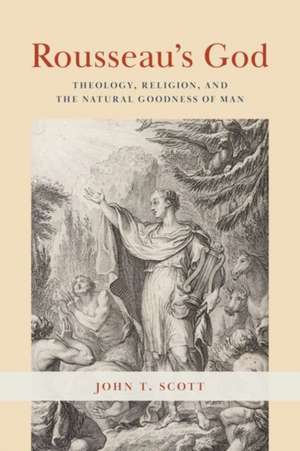Rousseau's God: Theology, Religion, and the Natural Goodness of Man
Autor John T. Scotten Limba Engleză Hardback – 18 apr 2023
John T. Scott offers a comprehensive interpretation of Rousseau’s theological and religious thought, both in its own right and in relation to Rousseau’s broader oeuvre. In chapters focused on different key writings, Scott reveals recurrent themes in Rousseau’s views on the subject and traces their evolution over time. He shows that two concepts—truth and utility—are integral to Rousseau’s writings on religion. Doing so helps to explain some of Rousseau’s disagreements with his contemporaries: their different views on religion and theology stem from different understandings of human nature and the proper role of science in human life. Rousseau emphasizes not just what is true, but also what is useful—psychologically, morally, and politically—for human beings. Comprehensive and nuanced, Rousseau’s God is vital to understanding key categories of Rousseau’s thought.
| Toate formatele și edițiile | Preț | Express |
|---|---|---|
| Paperback (1) | 200.18 lei 3-5 săpt. | +15.41 lei 7-13 zile |
| University of Chicago Press – 18 apr 2023 | 200.18 lei 3-5 săpt. | +15.41 lei 7-13 zile |
| Hardback (1) | 582.25 lei 6-8 săpt. | |
| University of Chicago Press – 18 apr 2023 | 582.25 lei 6-8 săpt. |
Preț: 582.25 lei
Preț vechi: 756.16 lei
-23% Nou
Puncte Express: 873
Preț estimativ în valută:
111.43€ • 115.90$ • 91.99£
111.43€ • 115.90$ • 91.99£
Carte tipărită la comandă
Livrare economică 12-26 aprilie
Preluare comenzi: 021 569.72.76
Specificații
ISBN-13: 9780226825489
ISBN-10: 0226825485
Pagini: 272
Dimensiuni: 152 x 229 x 23 mm
Greutate: 0.48 kg
Ediția:1
Editura: University of Chicago Press
Colecția University of Chicago Press
ISBN-10: 0226825485
Pagini: 272
Dimensiuni: 152 x 229 x 23 mm
Greutate: 0.48 kg
Ediția:1
Editura: University of Chicago Press
Colecția University of Chicago Press
Notă biografică
John T. Scott is distinguished professor of political science at the University of California, Davis. He is the author most recently of Rousseau’s Reader: Strategies of Persuasion and Education, also published by the University of Chicago Press.
Cuprins
List of Abbreviations
Introduction
Chapter 1: Truth and Utility
Chapter 2: The Theodicy of the Discourse on Inequality
Chapter 3: Pride and Providence in the Letter to Voltaire
Chapter 4: Psychic Unity and Disunity and the Need for Religion
Chapter 5: Introduction to the “Profession of Faith”
Chapter 6: The Theological Teaching of the “Profession of Faith”
Chapter 7: The Critique—and Revival—of Religion in the “Profession of Faith”
Chapter 8: On Civil Religion
Conclusion
Acknowledgments
Notes
Bibliography
Index
Introduction
Chapter 1: Truth and Utility
Chapter 2: The Theodicy of the Discourse on Inequality
Chapter 3: Pride and Providence in the Letter to Voltaire
Chapter 4: Psychic Unity and Disunity and the Need for Religion
Chapter 5: Introduction to the “Profession of Faith”
Chapter 6: The Theological Teaching of the “Profession of Faith”
Chapter 7: The Critique—and Revival—of Religion in the “Profession of Faith”
Chapter 8: On Civil Religion
Conclusion
Acknowledgments
Notes
Bibliography
Index
Recenzii
"There is much more that could be said on this subject, of course, as on the many other aspects of Rousseau’s philosophy upon which Scott advances deeply insightful and thought-provoking interpretations. One of the many successes of Rousseau’s God is that it shifts the burden of proof onto those who think that the Vicar does represent Rousseau’s own views. Anyone wishing to defend that interpretation henceforth should either respond to Scott’s forceful challenges or conclude that Rousseau was inconsistent on topics of central importance to his thought."
"It would be difficult to overpraise this book. Scott gives a comprehensive and coherent account of Rousseau’s thought. . . .For anyone who is unfamiliar with Rousseau’s thinking about the existence of God, the question of theodicy, and the role of religion in society this work provides a compact and accurate overview of all this and more."
"The clarity of the writing, explanations of key texts, attention to historical context and interlocutors, and expertise of Scott on Rousseau all make this an essential volume for Rousseau and religion."
"Rousseau’s God considers an important question in the manner it deserves: thoroughly. Scott succeeds in reconstructing the entire complex edifice of Rousseau’s theology and relating it to the broader and even more complex context of Rousseau’s thought as a whole. This is a remarkable achievement and a major contribution to understanding Rousseau."
"Rousseau’s God is an original and wide-ranging examination of Rousseau’s theological and religious writings. John Scott draws fertile connections to other key concepts in Rousseau’s broader project and pulls together multiple analytical threads into an exceptionally lucid and comprehensive interpretation that shows just how deeply the distinction between truth and utility permeates Rousseau’s treatment of religion (both doctrine and practice) throughout his works."
